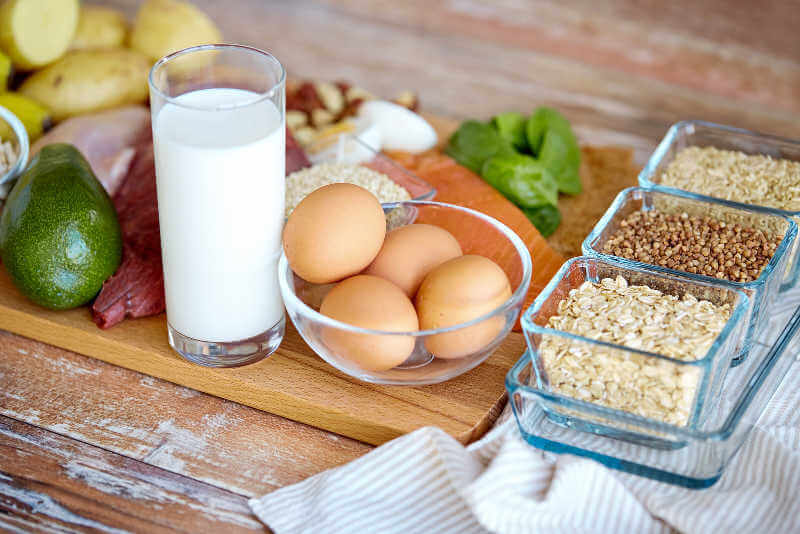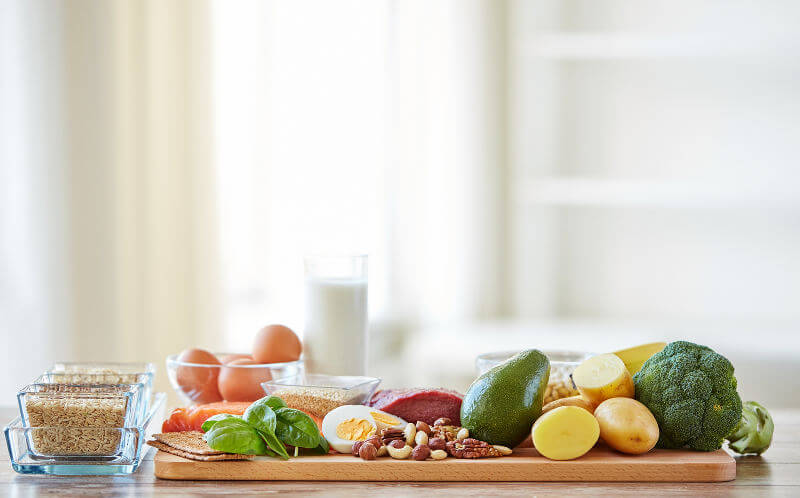Contents
Part 1 - What to do if you are overweight
Part 2 - What to do if you are underweight
Part 1, Overweight - Why is your weight so important?
Your weight prior to conception is very significant, and can play a big role in your rate of conceiving, as well as in complications during pregnancy and labor.
Women that are underweight or overweight have an increased rate of infertility, and a reduced probability of becoming pregnant if receiving assisted reproduction treatments.
These difficulties are sometimes associated with menstrual dysfunction, and anovulation due to hormone imbalances. The menstrual cycle is controlled by hormones. There is also a strong association between preconception weight, and an increased risk of preeclampsia (a complication during pregnancy that is characterized with a raise in blood pressure and can be very serious).
Women that are overweight prior to conception are at an increased risk of developing gestational diabetes, pregnancy-related high blood pressure, miscarriage, preterm birth, and congenital birth defects such as neural tube and heart defects, and gastrointestinal malformations. They also have a higher risk of complications during childbirth, and heavy blood loss after giving birth.
How do I determine what my ideal weight should be?
Your family doctor will use a tool called the Body Mass Index (BMI) to determine if your weight is within your ideal weight range for your age and gender. BMI is a measure of body fat that is based on your height and weight. The BMI calculation is as follows:
BMI = kg/m2 "Kg" is your weight is kilograms and "m2" is your height in meters squared.
A BMI of 25.0 or higher is overweight, and a BMI of 18.4 or lower is underweight. A healthy body weight is considered a BMI between 18.5 and 24.9. This applies for most adults that are between the ages of 18 and 65 years and are not currently pregnant or breastfeeding.
| BMI | Class |
| <18.4 | Underweight |
| 18.5-25 | Normal weight |
| 25> | Overweight |
Here is a link to an online BMI calculator you can use to quickly check your body weight.
If you would prefer to think of your ideal weight range in terms of kilograms or pounds instead of a BMI number, you can use the following formula:
- 18.5 x m2 = kg (for the bottom of your ideal weight range)
- 24.9 x m2 = kg (for the top of your ideal weight range)
- To convert kilograms to pounds, multiple each number by 2.2
For example, if you are 165 cm (5 foot 5 inches) tall, your ideal weight range would be 50.4 to 67.8 kg or 111 to 149 lbs. Unfortunately, there are many flaws with using BMI to determine an individual's healthy weight range.
- BMI does not account for whether the weight is carried as muscle or as fat. If you have a higher muscle mass or are very athletic, you may have a BMI that is above what is considered a healthy range, but not be at greater health risks.
- BMI is not appropriate to use on individuals under the age of 18 or by women that are pregnant or breastfeeding.
- BMI does not take into account ethnicity or bone size.
For now, BMI is still the tool used. It provides your doctor with an idea about whether you are at risk when it comes to weight related health complications.
What to do if you are not at your ideal weight:
Calorie restriction or weight maintenance during pregnancy is not recommended for overweight or obese women, as this may be harmful to the baby. Therefore, obtaining a healthy weight prior to getting pregnant is very important.
However, losing weight is not easy and if you want to become pregnant, it is important to ensure your body is getting all the nutrients it needs to prepare for pregnancy. Many of the fad diets that are out there circulating on the Internet or in magazines are too restrictive and promise unrealistic weight loss goals, or use weight loss aids that are not scientifically proven to have any health benefits. If you are looking for a weight loss program or plan, make sure the plan follows these guidelines below:
it is important to ensure your body is getting all the nutrients it needs to prepare for pregnancy
Guidelines for a healthy weight loss plan:
- Offers a weight loss of no more than 1 kg (2 lbs.) per week.
- Is nutritionally balanced with foods from all food groups (fruit and vegetables, whole grains, milk and alternatives, and meat and alternatives) in each meal.

- A meal should have at least three out of the four groups included in it: Sample weight loss breakfast meal: 1 piece of whole grain bread, with 1 tbsp. all natural peanut butter, and an apple (with an option of a 1/2 cup of milk)
- Does not have you skipping meals, fasting, or "cleansing".
- Offers a maintenance plan that helps you enjoy a healthy lifestyle in the long-term.
- Offers you flexibility to suit your individual needs, likes and dislikes, allergies, intolerances, or cultural restrictions.
Lifestyle changes as opposed to diets are the best course of action when wanting to loss weight. And the best changes are those that are sustainable for you in the long-term. Choosing one realistic change at a time also helps make it more sustainable. Once it has become a habit, you can add in another change.
Some changes that can help you manage your weight are:
- Eat more vegetables and fruit - fill half your plate with vegetables at lunch and dinner
- Substitute refined (white) grains for whole grains to increase your fiber intake
- Eat smaller amounts of meat, fish, and poultry - choose leaner cuts and remove the skin
- Eat less high fat foods - choose baked, broiled, barbecued, or steamed foods instead
- Choose skim or 1% milk and yogurt
- Drink water when thirsty instead of pop or fruit drinks
- Eat three meals a day with 2-3 snacks - eating regularly will help you stay in control of your food choices
- Lower your portion sizes - try using smaller dishes so that your eyes will still see a full plate
- Eat slower - it takes about 20 minutes for your brain to register that the stomach is full
Setting S.M.A.R.T goals will help you make sustainable changes:
Make sure your goal follows these guidelines.
Goals should be:
S - Specific: clearly outline what you want to do
M - Measurable: how much, and how often
A - Action-oriented: a behavior that you have direct control over
R - Realistic: you should be at least 80% confident that you can achieve this goal
T - Time-framed: have an idea how long it will take for you to achieve this goal
Examples of a S.M.A.R.T goal:
I will start eating 2 cups of vegetables at lunch and supper at least 5 days a week.
Note: "I want to lose 10 lbs." is not a goal because this does not provide you with an action.
A Nutrition FACT!
"Based on self-reported food intakes, individuals in the healthy BMI range and those in the overweight and obese BMI ranges tend to eat the same amount of calories. The difference is in the type of calories that they consume. Individuals in the overweight and obese BMI ranges tend to have diets that are higher in fat and lower in carbohydrates, fruit, and fiber. Those with lower BMI's tend to eat the most finer".
Part 2, Underweight - Why is your weight prior to conception so important?
Your weight prior to conceiving, whether it is under or over the recommended weights, can play a big part in your rate of being able to conceive. This can be associated with hormone imbalances that cause irregular menstruation.
Women that are underweight prior to conception are at an increased risk of having premature, low birth weight, and small-for-gestational-age babies.
Research shows that women with low preconceptions weights are at risk of not gaining adequate weight during pregnancy, which can restrict the fetal growth of the baby.
Another concern is possible inadequate nutrient intake and the effect that this can have on the baby during the early weeks of pregnancy.
How to determine what your ideal weight should be
Ideal weight ranges are determined using a calculation that measures body fat. This tool is called the Body Mass Index (BMI). This tool applies for adults that are between the ages of 18 and 65 years, and are not currently pregnant or breastfeeding.
| BMI | Class |
| <18.4 | Underweight |
| 18.5-25 | Normal weight |
| 25> | Overweight |
What to do if you are underweight
Obtaining a healthy weight prior to becoming pregnant is very important for your health, and the health of your baby once you do conceive. This will help ensure that your body has what it needs right from the start to grow and support a healthy baby.
Being underweight may put you at risk of nutritional deficiencies such as protein, iron, calcium, folate, vitamin D, and vitamin B12. If you eat a diet that has little to no fat in it, you may also become deficient in fat soluble vitamins such as vitamin A, E, D and K. Deficiencies in these nutrients may cause your bones to become fragile and can lead to osteoporosis. They may also weaken your immune system, and lead to anemia. On top of the effects they may have on you, these nutrient deficiencies may lead to birth defects for your baby, and your baby may also develop the same deficiencies.
However, gaining weight does not mean filling your plate with unhealthy high calorie snack foods. While eating these foods may lead to weight gain, it does not address the nutrient deficiencies mentioned above. You want to make sure that the foods you are consuming will give your body the right nutrients that it needs, and that you are gaining weight in a way that supports your health.
Changing your pattern of eating, and your food choices is not an easy task.
Making small changes that are easy for you to incorporate into your every day life, and to the foods you are already eating will be the best way to help you achieve a healthy weight prior to conception.
Steps to take
Here are some healthy lifestyle tips, and meal ideas to help you gain weight that reinforces your health for conception:
Eat three meals a day
A healthy balanced meal includes foods from at least three of the following food groups:
- Fruits and vegetables: such as apples, bananas, berries, avocado, carrots, broccoli, spinach, sweet potato, and bell peppers.
- Whole grains: such as whole grain breads and pastas, brown or wild rice, quinoa.
- Milk and alternatives: such as milk, yogurt, cheese, cottage cheese, kefir, and soy beverage.
- Meat and alternatives: such as meat, poultry, eggs, nuts, seeds, legumes, and tofu.

Eat three balanced snacks a day
This will help you keep your energy up and ensure you are meeting your nutrient requirements. A healthy balanced snack includes foods from at least two of the food groups mentioned above. Some ideas for healthy snacks are:
- Peanut butter and whole grain toast
- Whole wheat crackers and cheese
- Half an egg salad sandwich
- Yogurt with granola and dried fruit
- Oatmeal and almonds
- Smoothie: Greek yogurt & berries
- Trail mix: mixed nuts and dried fruit
- Hummus and veggies
Eat frequently
Aim to eat a meal or snack every 3 to 4 hours, and include a snack before you go to bed. If you find that you tend to feel full fast, eating frequently can help you reach your calorie and nutrient needs for the day.
Avoid "empty calories"
Such as soda pop, chips, and ice cream. Instead, focus on nutrient dense foods, like nuts, avocados, whole grains, legumes, eggs, milk. Do not choose the "reduced fat" or "light" options of healthy foods.
Drink beverages between meals and snacks
Or save them until after you have finished eating. This will help ensure that you do not fill up on these before having the chance to get enough calories and nutrients from food.
Include a protein source with each meal and snack
The milk and alternatives and meat and alternatives food groups offer some great choices for protein sources. Add protein throughout your day by:
- Adding ground meat, poultry or tofu to pastas, casseroles, stir-frys, omelets, and soups
- Adding a hard boiled egg to salads
- Adding nuts and seeds to baked goods, oatmeal, cereal, salads, yogurt, and stir-frys
- Adding cheese to casseroles, pastas, salads, and sandwiches
An Example of Healthy Balanced Menu For Achieving Your Ideal Weight For Conception
- Breakfast: A hard boiled egg with a bowl of oatmeal, and a sliced banana
- Mid-Morning Snack: Yogurt with dried fruit and granola
- Lunch: Tuna sandwich with cream of broccoli soup topped with grated cheese, and carrot sticks on the side
- Mid-Afternoon Snack: half a bagel and cheese
- Supper: Chicken and vegetable stir-fry on brown rice
- Evening Snack: Mixed berry smoothie made with plain yogurt or milk
Note
Some women are predisposed to being underweight, and find it difficult to gain weight. In this instance, your focus should be on ensuring that you are receiving adequate nutrition by eating a balanced diet that consists of three meals and three snacks a day, as outlined above.
If you follow the tips above and do not see an increase in your weight, do not despair. You have provided your body with proper nutrition and this will help keep you and your future son or daughter healthy!








